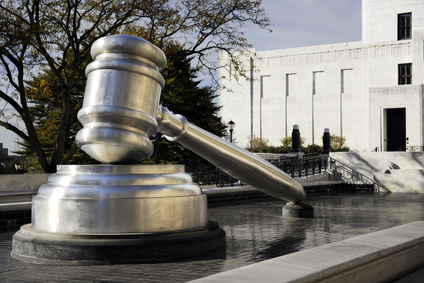In an unpublished opinion, the U.S. Court of Appeals for the Eleventh Circuit recently held that a consumer alleging that she did not receive disclosures required by the federal Fair Debt Collections Practices Act (FDCPA) sufficiently alleged that she suffered a concrete injury, and thus satisfied the standing doctrine’s injury-in-fact requirement under Article III of the U.S. Constitution. In so ruling, the Court confirmed that the FDCPA only applies to debts that are in default when the debt collector obtained them, rejecting the consumer’s argument that “a debt can be in default before the debtor is ever asked to pay…
The Appellate Court of Illinois, Second District, recently held that when a mortgagee obtains a deficiency judgment in a foreclosure action, purchases the property at a judicial sale, and then resells it to a third party for an amount that exceeds the price paid at the judicial sale, the debtor is not entitled to a setoff in the mortgagee’s enforcement proceedings to recover the deficiency judgment. A copy of the opinion in Old Second National Bank v. Jafry is available at: Link to Opinion. In June 2013, the trial court entered a judgment of foreclosure and sale with respect to a…
The District Court of Appeal of the State of Florida, Fourth District, recently reversed summary judgment in favor of a mortgagee, holding that a genuine issue of material fact as to whether the original plaintiff or the substituted successor in interest held the note when the complaint was filed precluded summary judgment, and thus that the borrower’s lack of standing defense was not refuted. A copy of the opinion in Craven-Lazarus v. Pennymac Holdings, LLC is available at: Link to Opinion. A mortgagee sued to foreclose its mortgage. The complaint alleged that it was “entitled to enforce the Note as a…
In a case involving the enforceability of so-called “clickwrap” web-based agreements, the U.S. Court of Appeal for the Eleventh Circuit recently affirmed the denial of a defendant’s motion to compel arbitration, holding that the defendant failed to prove the existence of an agreement to arbitrate. Because the Court found that the defendant offered no competent evidence to demonstrate the existence of a genuine issue of material fact concerning the existence of an arbitration agreement, the debt buyer’s motion to compel arbitration must be denied as a matter of law without the need for a trial. A copy of the opinion…
The U.S. Court of Appeals for the Fourth Circuit recently held that a lender’s practice of charging late fees when the amount of the payment was insufficient to cover both the scheduled payment and earlier late fees violated Maryland’s Credit Grantor Closed End Credit Provisions (CLEC). However, the Court also held that the lender’s practice of applying payments first to late charges, then to accrued interest, and then to principal, as well as the lender’s internal accounting practices, did not violate CLEC. A copy of the opinion in Williams v. Lendmark Fin. Serv. is available at: Link to Opinion. In 2009,…
The Supreme Court of Ohio recently held that, when debt on promissory note secured by mortgage has been discharged in bankruptcy, the holder of the note may not pursue collection against the maker of note, but the mortgagee has standing to foreclose on the collateral property, and can use the amounts due on the note as evidence to establish that it may collect from the forced sale of the property. The Court also held that, regardless of whether the creditor can obtain a personal judgment on the note against the borrowers, the creditor must still prove that it is the…
The U.S. District Court for the Middle District of Georgia recently held that when a mortgagee makes some affirmative misrepresentation or action that renders a foreclosure sale unfair, a claim for wrongful foreclosure may stand independently of a claim for fraud. The Court also held that the statute of limitations on a claim under a security deed is 21 years, if the security deed is a sealed instrument under Georgia law. A copy of the opinion in Malone v. Federal Home Loan Mortgage Corporation is available at: Link to Opinion. On Aug. 26, 2007, in connection with a refinance mortgage…
The U.S. Court of Appeals for the Eleventh Circuit recently reversed in part a trial court’s ruling granting summary judgment in favor of a debt buyer, its affiliated debt collector and their parent company, holding that a reasonable jury could find that the defendants willfully violated section 1681s-2(b) of the federal Fair Credit Reporting Act when they reported two charged-off debt accounts as “verified” without obtaining sufficient documentation that the debts in fact belonged to the plaintiff consumer. In so ruling, the Court held that a jury could find that because the buyer retained the right to seek account-level documentation…
The Appellate Court of Illinois, Second District, recently held that a foreclosure judgment was void, where the foreclosing first mortgagee did not properly name a second mortgagee in its summons. A copy of the opinion in U.S. Bank National Association v. Johnston is available at: Link to Opinion. In 1997, the defendant borrowers executed a mortgage and note against their rental property. The mortgage conveyed a lien interest in the property as security for the note to the first mortgagee. This first mortgage was recorded. On Jan. 28, 2005, the defendant-borrowers executed a second mortgage and note against the property. The…
The U.S. Court of Appeals for the Eighth Circuit recently held that “[a]n accurate and complete proof of claim on a time-barred debt is not false, deceptive, misleading, unfair, or unconscionable under the FDCPA.” In arriving at this holding, the Court declined to follow the Eleventh Circuit’s rulings in Crawford and Johnson. A copy of the opinion in Nelson v. Midland Credit Management, Inc. is available at: Link to Opinion. As you may recall, in Crawford v. LVNV Funding LLC, the Eleventh Circuit held that a debt collector violates the FDCPA when it files a proof of claim in a bankruptcy case…
The U.S. District Court for the Eastern District of New York recently granted summary judgment in favor of a debt collector, holding that the debt collector did not violate the federal Fair Debt Collection Practices Act (FDCPA), 15 U.S.C. § 1692, et seq., by reporting a debt as “deleted” rather than “disputed,” and by asking probing questions in response to a call from the consumer disputing the debt. In addition, the Court denied the plaintiff’s motion for class certification on ascertainability grounds, holding that trying to decipher the debt collector’s summaries of its calls with the putative class members would not be…
The U.S. Court of Appeals for the Seventh Circuit recently held that as a matter of federal procedural law, a judgment of foreclosure is not a final and appealable judgment, even if state foreclosure law might provide otherwise. Here, the Court held that a Wisconsin judgment of foreclosure was not final and appealable when obtained in a federal district court, even though Wisconsin law treats a foreclosure judgment ordering a sale as final and appealable. A copy of the opinion in Bank of America, N.A. v. Martinson is available at: Link to Opinion. A mortgagee filed suit to foreclose a residential…












